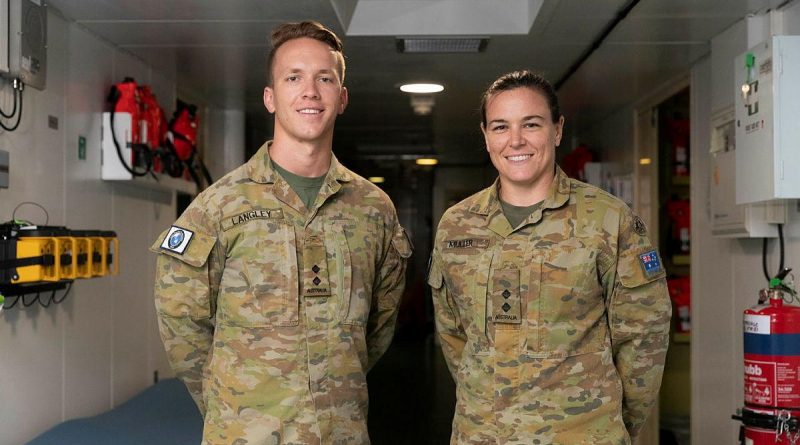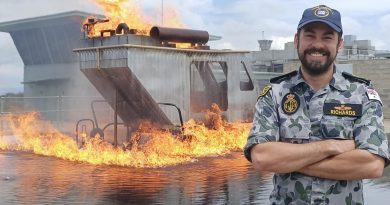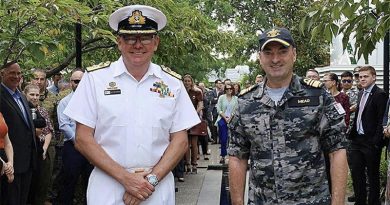Army boosts ship’s health capability

Six Army health personnel are working on board HMAS Canberra during Indo-Pacific Endeavour 2021 (IPE21), lending a green hue to the maritime-focused deployment.
CAPTION: Army radiographer Lieutenant John Langley and physiotherapist Lieutenant Alison Muller in the health centre in HMAS Canberra during Indo-Pacific Endeavour 21. Story by Captain Peter March. Photo by Leading Seaman Nadav Harel.
It’s not unusual for Army medical staff to work in landing helicopter dock ships such as Canberra as the Royal Australian Navy doesn’t employ pharmacists, scientific officers, radiographers or physiotherapists.
The Army team – two members of the ship’s company and four IPE21 embarked staff – is on board to ensure the crew’s health is maintained.
Army radiographer Lieutenant John Langley, of the Maritime Operational Health Unit (MOHU), provides the IPE21 Task Group with a diagnostic medical imaging capability.
“We have three different medical imaging machines on board, and they all have a variety of different uses to ensure that, whatever the situation, we are able to provide x-ray support to the medical team and for the wider task group, with our usual patient presentations being musculoskeletal injuries,” Lieutenant Langley said.
“I also perform a large quantity of chest x-rays looking for infections, which has become imperative as we deploy during COVID-19 times.”
While Lieutenant Langley said he enjoyed spending time at sea, he admitted the isolation from his counterparts made his job more challenging.
“Radiographers at MOHU deploy as sole operators, which is unique compared to civilian hospitals or Army field hospitals,” Lieutenant Langley said.
“Being at sea with restricted connectivity means we have limited support from shore, which requires us to have a wider skill set with a focus on radiation safety, and to be confident in our technical abilities in order to provide the best imaging advice possible.”
Army physiotherapist Lieutenant Alison Muller, of the 1st Close Health Battalion, is at sea for the first time and is finding new ways to work.
“The injuries I’ve seen on the ship are all similar to what we’d see at home, but the way that I rehabilitate them is different because of access to resources,” Lieutenant Muller said.
Lieutenant Muller has provided an invaluable service to members of the ship’s company, who regularly deploy without a physiotherapist, but may have ongoing needs for rehabilitation.
Canberra’s senior health officer Lieutenant Commander Holly Murphy said she appreciated the capability personnel such as Lieutenants Langley and Muller brought to the team.
“They’re technically very well-skilled, and I know the crew hold them in high regard,” Lieutenant Commander Murphy said.
“I enjoy working with the Army guys – it’s a really great team. They fit in well and have adapted to sea life well.”
Lieutenant Muller said the feeling was mutual.
“I’ve never really worked with Navy before, so learning how they operate is something new for me that has been really enjoyable,” she said.
“It’s a tight-knit medical team.
“We live with each other and work with each other, so we’ve come to know each other a whole lot better, and have certainly made some good friends on board.”
.
.

.
.





